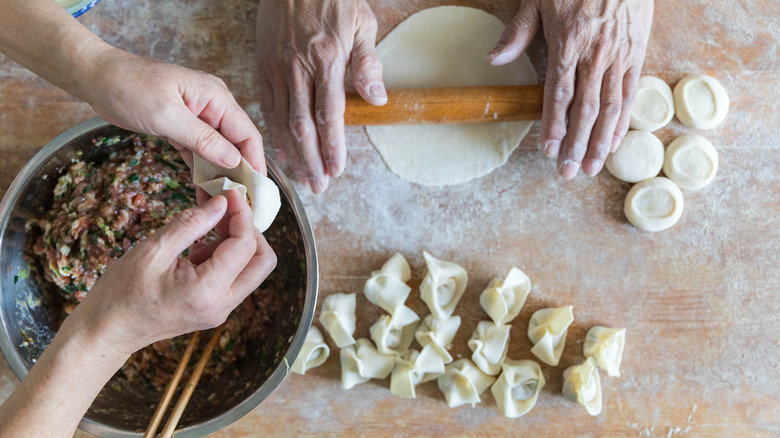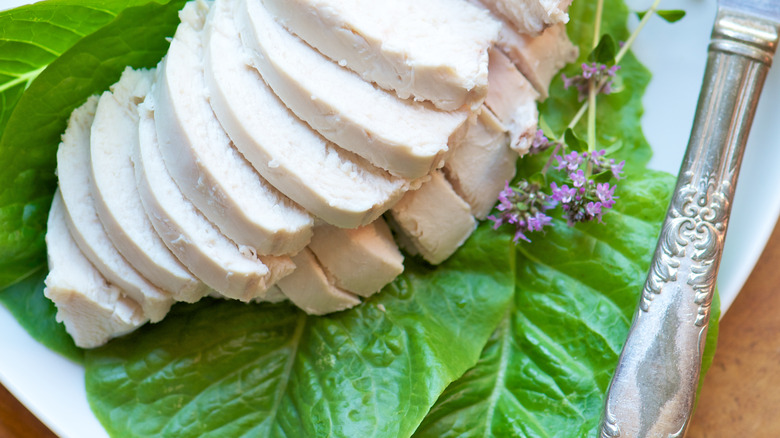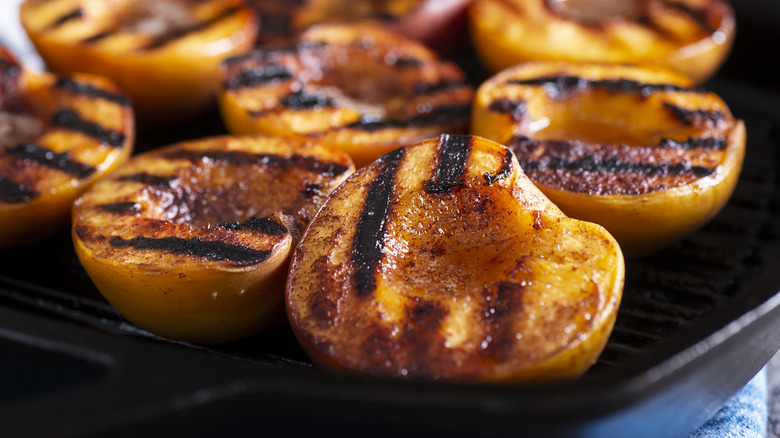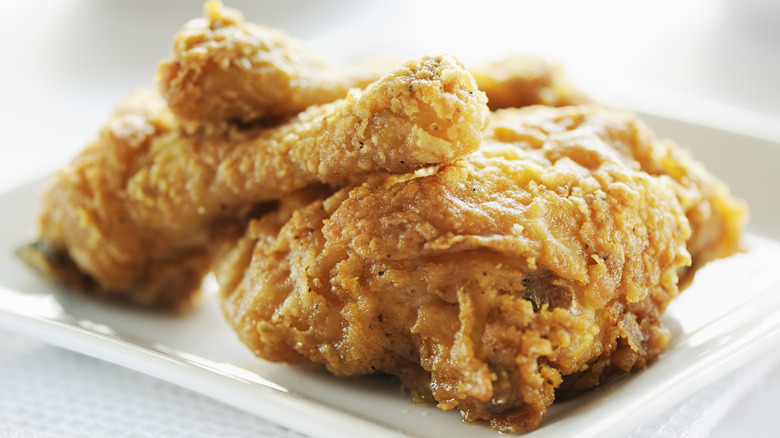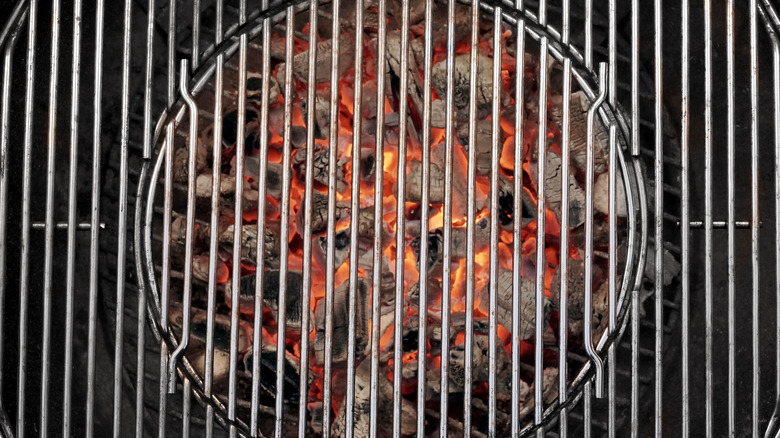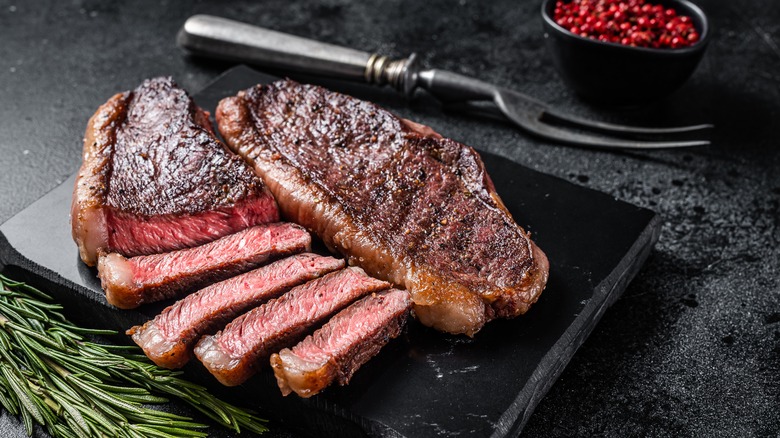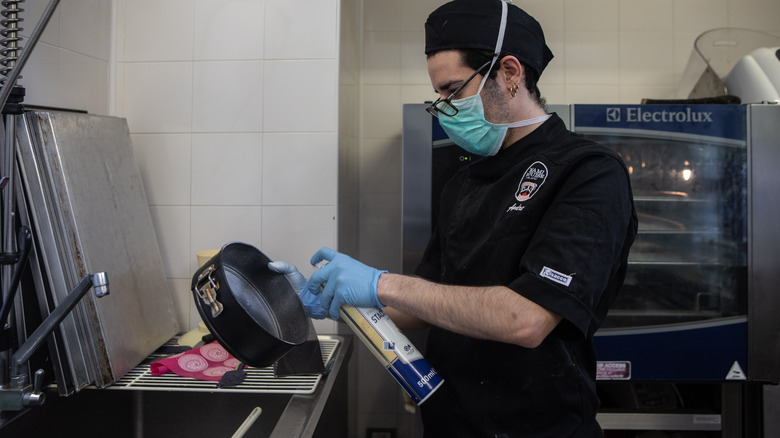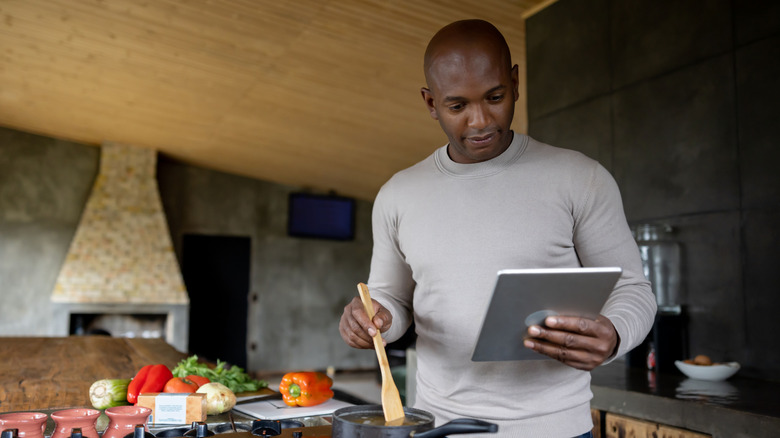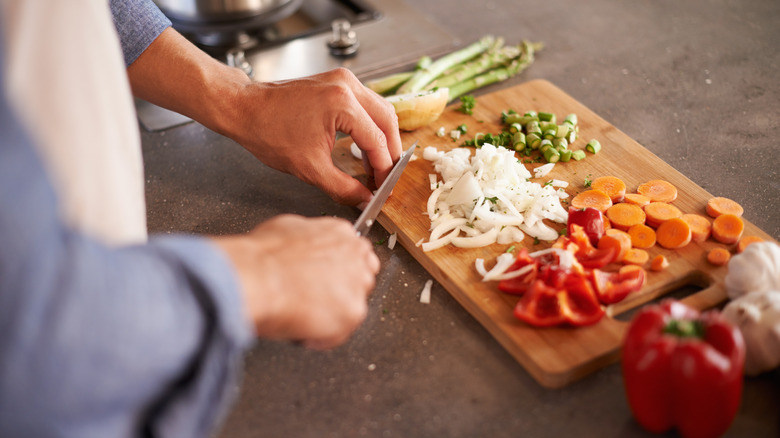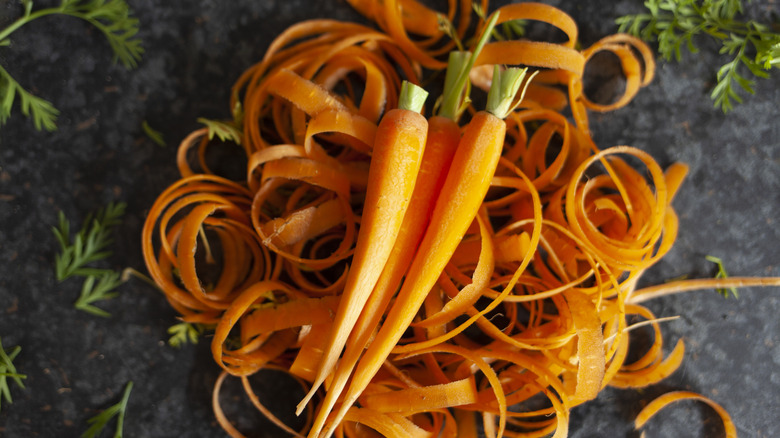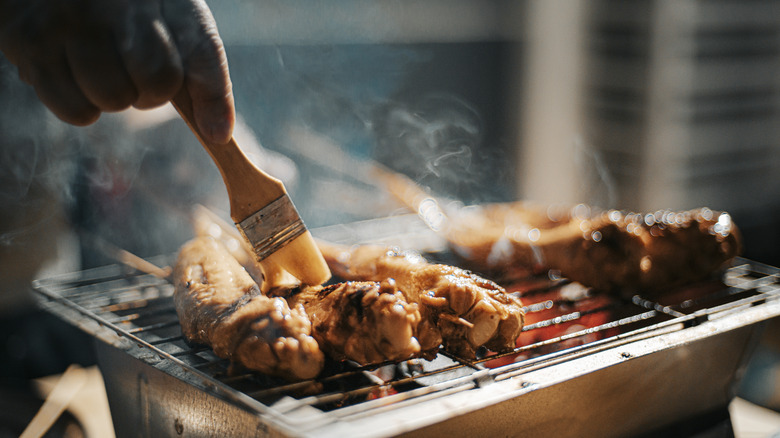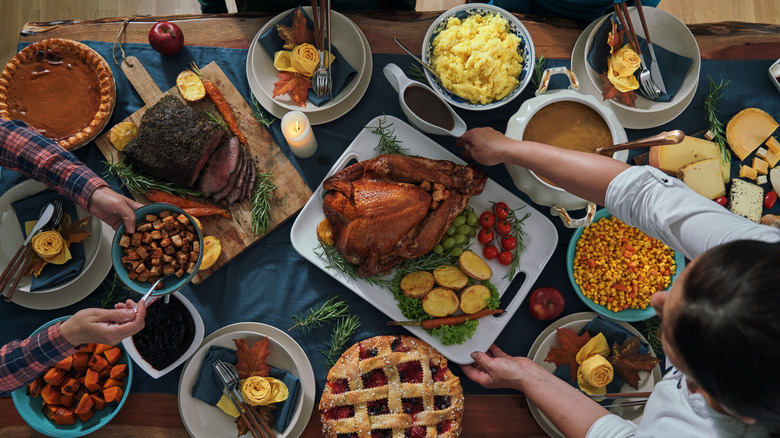The Handiest Home Cooking Tips, Courtesy Of Andrew Zimmern
If you only know Andrew Zimmern from his "Bizarre Foods" shows, you might not consider him your first pick for practical advice on home cooking. Because let's face it, if you're trying to get dinner on the table quickly with nothing but ordinary supermarket ingredients and equipment, would you turn to a guy whose job seems to be traveling the world and tracking down the strangest meals to sample?
But a closer look at Zimmern's resume will remind you that he's a credible cooking mentor. The man is a four-time James Beard Award winner, as well as the experienced host of numerous other cooking shows on everything from family dinners to cooking over open fires. Before launching his TV career, he cooked in a number of restaurants, apprenticing under star chefs like Joachim Splichal and Thomas Keller — so yeah, he has serious experience as a hands-on cook.
Hands-on cooking remains the heart of his many shows and projects; his newsletters and YouTube channel contain plenty of useful content for those looking to take their kitchen cooking to the next level. Here are some of his best tips.
Don't overdo the filling
There's something fun and festive about food wrapped into little parcels. Everybody loves dumplings (and empanadas and turnovers and pierogis) because of the contrast in flavors and textures they offer, but also because they're cute — they're like little wrapped presents, each with a flavorful treat inside.
Enthusiastic home cooks love making such foods for special occasions because they're a labor of love. Of course, there are also serious bragging rights to those who can present a big helping of these delicious, perfectly-formed homemade treats.
One reason this is true is because they're not easy to do right. Pretty much anyone who's tried to make them has, at one time or another, ended up with a dumpling or pastry (or several) that exploded or leaked out its filling. Sometimes this happens because the wrapper hasn't been sealed completely; according to Zimmern, an even more common root cause is using too much filling.
It's an easy mistake to make, since everyone loves a generously stuffed dumpling or pastry. But in reality, most of these treats can't hold nearly as much filling as we all tend to think, so it's useful to err on the side of caution if you want to avoid explosions.
It's easy to poach chicken perfectly
Be honest: When was the last time you poached a chicken? If you're like most home cooks, chances are it wasn't recently — if ever. For many, roasting or pan-frying are more familiar and comfortable techniques, giving home chefs that nice crispy brown skin that poaching just doesn't. Besides, while poached chicken yields white meat that's velvety, moist, and tender (rather than dry and chalky), isn't poaching tricky, fussy, and just flat-out too fancy for normal cooks to do at home?
According to Zimmern, this is not the case. Instead, poaching can be a foolproof way to get perfectly cooked chicken without a lot of work. Just immerse a whole chicken in boiling stock, lower the heat to simmer for one minute, then turn off the heat and cover the pot. After 90 minutes of hands-off waiting, you'll have a perfectly poached chicken — and as a bonus, you'll also have a pot of super-flavorful chicken stock for use in soups and sauces.
Grilling is an easy way to make old fruit special
Everybody knows fresh fruit is good for you, and when it's ripe, it can taste amazing. But most people have mostly-okay-but-not-great industrially-farmed fruit in the kitchen, and after a few days, you might not feel super excited about eating it. You could always whirl it into smoothies — a far better option than tossing it — but even that gets old after a while.
Zimmern has an easy solution for breathing life into subpar fruit — particularly stone fruit such as peaches and plums, which can get unpleasantly mealy if overripe or unevenly ripened: Grill it.
He suggests brushing cut fruit with vegetable oil and adding a sprinkle of sugar and lemon juice before grilling. The heat both improves the fruit's texture and adds an appetizing layer of caramelization that accentuates its sweetness. Grilled fruit can be used for both dinner and dessert — as a flavorful accompaniment to grilled meat (Zimmern reports that slices of grilled, underripe mango are a great match with grilled shrimp) or as a summery topping for vanilla ice cream.
A big paper bag makes for mess-free breading
It's easy to love fried chicken, but there's a good reason many people, including a lot of proficient cooks, prefer getting theirs from a take-out place: It is seriously messy work.
Breading the pieces requires a lot of crumbs, flour, and/or wet binders such as milk and eggs, all of which will leave drips and spills coating your kitchen as you coat your chicken. Then the frying itself requires a lot of oil, and no matter how neatly you work, your backsplash will require some major cleanup afterwards — oh, and your kitchen will likely smell like grease for the rest of the week.
While there's no way to make frying chicken at home a totally mess-free project, Andrew Zimmern has a smart trick for at least mitigating this mess. Instead of putting his breading in bowls or pans for coating the chicken pieces, he puts his dry coating ingredients in a big paper bag and dumps the chicken pieces in with the coating. Shaking the bag around for a minute or so will be enough to evenly coat the chicken, and you won't have to deal with crumbs or flour all over your counter and floor (you can then just dump the bag, used coating and all, into the trash). This hack works for other fried foods as well.
Buy a bigger grill than you think you'll need
Part of the appeal of outdoor grilling is how wonderfully primal it is — nothing but you, fire, and food, like how the earliest humans cooked their meals. But if you've actually tried grilling anything other than hot dogs and burgers, you know it requires a certain skillset.
Temperature matters, and many preparations require cooking at multiple temperatures — for example, starting on a high temperature for initial browning, then a slower cooking period at a lower temperature. This means you need to be able to control the heat in your grill precisely, generating both high and low heat.
The standard technique for doing this is to employ both direct grilling (high-heat cooking directly over the heat source, such as coals or wood) and indirect grilling (lower-heat cooking away from the heat source, typically to one side of the banked hot coals or wood) simultaneously. To ensure you get the best possible control over these two zones, Zimmern recommends getting a bigger grill than you think you'll need, as maintaining distinct temperature zones on a tiny grill can be something of a fool's errand.
Let your steak cool before serving and eating it
Some foods are at their best right off the grill or out of the stove. If you're going to go to the trouble of grilling a hot dog, you'd be missing out if you didn't grab and eat it as soon as it was done. But if you're an experienced home cook, you also know that some foods benefit from a bit of time to settle before serving, such as pies and casseroles. This not only allows them to cool to a temperature that's safe to eat, but also allows their textures to stabilize.
Then there are foods that look like they'd be scrumptious to eat right off the fire, but can similarly benefit from a resting period. Zimmern insists that steak is one such food. Yes, everybody knows how amazing a fresh-off-the-grill (or out-of-the-pan) steak looks, smells, and even sounds. But counterintuitively, Zimmern insists it'll taste even better once it cools off a bit.
Many cooks, in fact, recommend resting steaks for about 10 minutes before serving; Zimmern goes one step further, advocating for an even lengthier resting period.
"When the meat rests and starts to get cool, all of that fat goes back into the muscles and becomes much more tender," Zimmern explained to Business Insider in 2017. "I would grill the steak and take it off the grill about 45 minutes before we eat it. And I would let it rest, and it would ultimately be at room temperature."
Keep a can of cooking spray by your grill
One of the most annoying pitfalls of grilling is dealing with food that sticks to the grill. This is often the direct result of another common grilling problem: a dirty grill. Sure, grills are a pain to clean and it's not always easy to notice and clean absolutely every bit of burnt-on gunk, but that residue can cause anything you try cooking later to stick, and that will result in disappointing (or worse, completely wasted) food.
To forestall these problems, Andrew Zimmern recommends keeping a can of cooking spray by the grill. He uses this for a number of purposes: first, to lubricate the grill itself before introducing the food (especially those prone to sticking, such as chicken or fish), and second, to lightly coat the food itself before putting it on the grill. Another option, he says, is brushing the food lightly with olive oil. This double dose of protection will not only prevent sticking, but also keep additional food residue from sticking to the grill grates.
To improve your cooking, try two new recipes a week
Not everyone is a born cook; if you still struggle in the kitchen even after trying to educate yourself and improve your technique, there's nothing wrong with you. One simple way to cope with kitchen anxiety is sticking to a fixed rotation of tried-and-true dishes that you feel confident cooking. Since you know they'll turn our right, you'll have peace of mind knowing both you and those you're cooking for will come away happy.
But as the old saying goes, no pain no gain. You won't ever improve or grow as a cook by staying in your comfort zone.
According to Andrew Zimmern, the secret to improving your cooking game isn't throwing yourself into producing Escoffier-level feasts every night, but instead gradual, steady growth through regular practice. "I tell people all of the time, if you want to be a better cook, cook two recipes a week that you have never cooked before. You can find them free online, in books, in magazines — they are everywhere," Zimmern told Morning Honey in 2021. "Cut up a couple of carrots and onions every other day," he added. "Your knife skills will improve about 1,000 percent, and then what some people see as the chore part of cooking will actually become enjoyable."
To speed up meal prep, cut up veggies in advance and freeze them
While proficient home cooks often find the routine chores of peeling and cutting veggies relaxing, this isn't always the case on busy weeknights when they're pressed to get dinner on the table quickly. This is especially true for those cooking for large families, since dicing carrots for six people takes a lot more time than dicing them for two.
But for those who are unwilling to compromise by resorting to take-out or frozen dinners, Zimmern offers a practical solution: Prep several batches of veggies ahead of time and keep them in the freezer. While this will involve an initial outlay of time (maybe this is something you can do on weekends or other less-busy periods), doing this will allow you to follow Zimmern's advice to set aside time each week to practice your knife skills. So, not only will you find yourself getting better and faster at vegetable prep, having pre-cut veggies at the ready in the freezer will further speed up your meal prep for the rest of the week.
Save your vegetable scraps in the freezer for stock and sauces
It's no secret that food is becoming increasingly expensive; even proficient cooks who save money by cooking from scratch at home are feeling the pinch. Some have resorted to choosing cheaper ingredients or adjusting their recipe repertoire to help make pricier ingredients go further — for example, opting for shrimp pasta rather than shrimp skewers as a main course.
Zimmern is aware of the challenges many have accessing high-quality food, and he feels a simple way to remedy the problem is to reduce food waste. One way to do this, he says, is to freeze all your vegetable scraps for future use.
"I save all of my vegetable scraps for stocks and soups," he told Morning Honey. He also recommends storing vegetables in flattened, labeled quart-size bags, which can be easily organized into a culinary "rolodex in your freezer." He added that this will not only help your personal food budget go further, but help stabilize the overall food supply. "If we got 10 percent of America to just do a little bit of a smarter job in their freezer, it has a positive net effect on our food system, and I think that is really, really crucial."
Marinades are an easy way to take dishes to the next level
Home cooks who want a good meal without a lot of work often turn to baked or grilled meats. They're great for time-pressed or tired cooks because all you have to do, quite literally, is heat and eat. (And of course, add a sprinkle of salt and pepper, and maybe some herbs if you're feeling ambitious). Add a quick salad, maybe a roll or two if you have any lying around, and you have a more than respectable dinner.
But as Andrew Zimmern shares, with just a minute or two of extra work and a little advance planning, you can take simple grilled (or baked) meats from basic to memorable — just add a marinade. A good marinade will not only supercharge the flavor of your meat (the salt in marinades draws liquid out of the meat, which allows the flavorings of the marinade itself to be easily absorbed), it tenderizes the meat and improves its texture. This transformation, however, requires some time, so Zimmern recommends doing as he does at home: prep your marinade and add the meat while cleaning up from dinner the night before. The next evening, your tenderized, flavor-filled meat will be ready to cook.
You don't have to cook everything if you don't want to
If you're a competent home cook, you've probably become accustomed to being recruited for making big meals from time to time. Maybe it's Thanksgiving, and the family has decided you should host again. Or maybe your spouse or kid is celebrating a special milestone, such as a birthday or graduation.
Since you're a kind and generous person, you're game to take on the task. Then you start planning and budgeting your menu and look at the available time and refrigerator space you have, and panic sets in. How did you let yourself get talked into this? And who does everyone think you are, Andrew Zimmern?
While Zimmern himself has cooked hundreds of restaurant meals and certainly knows how to cook for a crowd, he understands that this is not always possible or practical, even for proficient home cooks. Which is why he gives full permission to hand off whatever cooking tasks you don't feel up to doing.
"For big holidays... take the things you're not good at and outsource them," he told Rachael Ray. "You don't need to make all the recipes you've never made before." So, go ahead and ask your friends to bring dessert and side dishes. Or buy pre-made dishes from a restaurant or market you enjoy. Your guests are more likely to remember the company than the food in any case, so make sure you can enjoy the festivities as well.


